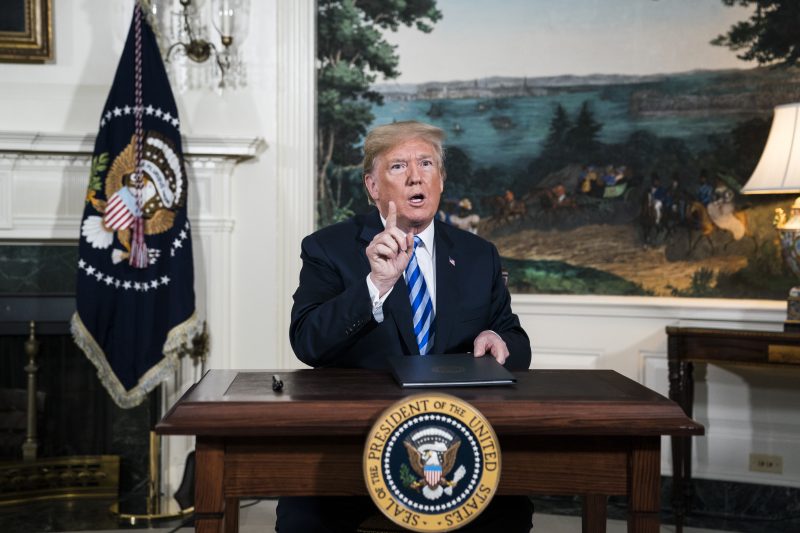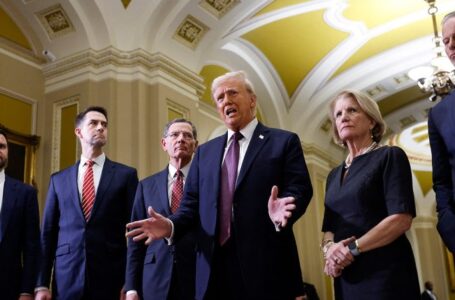Israel to remain in some West Bank refugee camps for ‘coming year’ as military expands campaign
Trump’s rhetoric on thwarting Iran vs. his record


Donald Trump has spent a good part of his public life crafting an alternate reality. Just two days after Trump took office in 2017, adviser Kellyanne Conway set the tone by citing how Trump’s White House had “alternative facts” about the inauguration crowd size — claims that were provable falsehoods. Trump went on to put forth more than 30,000 additional falsehoods during his presidency.
Today, Trump and his allies are increasingly pitching a different type of alternate reality: one in which Americans never booted him from office in 2020, and the major ills of this country and the world magically disappear — from inflation to the war in Ukraine to the war in Gaza.
But they’re starting to overreach.
“It would not have happened if we were in office,” Trump said this weekend of Iran attacking Israel with an unprecedented aerial assault. “You know that, they know that, everybody knows that.”
“This attack on Israel would have never happened under a Trump presidency,” Rep. Elise Stefanik (R-N.Y.) reiterated.
“These attacks on Israel would’ve never happened under President @realDonaldTrump,” added Republican Arizona Senate candidate Kari Lake.
“This would have NEVER happened under Trump,” said Rep. Wesley Hunt (R-Tex.), who like the other two has been mentioned as a possible Trump running mate. “Tell me I’m wrong.”
The upside of this strategy is evident, because you quite literally can’t prove Hunt wrong. It’s unfalsifiable. And Americans seem inclined to buy into the concept at least somewhat, judging by how their reviews of Trump’s presidency today are better than they ever were in real time. They trust Trump more than President Biden on foreign policy and national security, as well as inflation.
But rather than merely parroting the unfalsifiable claim, it’s worth putting it in context. And trying to apply the talking point to Iran undercuts the claim.
It’s true that we did not see a war in Gaza during Trump’s presidency. But we did see tensions between Israel and Iran threaten to boil over, repeatedly. And not only that. We saw Iran emboldened to attack not just Israel, but actual Americans.
On Jan. 3, 2020, a U.S. missile strike approved by Trump killed Iranian Maj. Gen. Qasem Soleimani, who the U.S. government said was planning attacks on Americans.
Days later, Iran hit back by striking a U.S. military base in Iraq. One contractor suffered a serious eye injury, and 110 troops suffered traumatic brain injuries while sheltering in place.
The provocation involved in directly attacking Israel last week is notable. But the attack’s actual toll — 99 percent of projectiles were intercepted, according to the Israel Defense Forces, and just one serious injury has been identified — pales beside the 2020 attack.
That 2020 attack, it bears noting, was also directly on U.S. personnel, rather than on a U.S. ally. Iraqi Prime Minister Adel Abdul Mahdi said Iran gave him a heads-up in advance that Americans were the targets. (Trump last year appeared to claim that Iran had also given him a heads-up that it would deliberately miss the base, but Washington Post Fact Checker Glenn Kessler called that “ludicrous,” while noting that most of the missiles in fact hit the base.)
The Iranian attack on American personnel was also unprecedented — the first time in decades of U.S.-Iran tensions that Iran had directly targeted an American position in the Middle East.
The comparison between the two events aside, it doesn’t exactly suggest that Iran was cowed by the strength of Trump’s presidency. Even if you regard Iran’s retaliation to Soleimani’s killing as limited — Trump would later suggest as much to justify his own lack of retaliation — the U.S. government concluded that Soleimani had been preparing to attack us on Trump’s watch.
That this all happened in Trump’s final full year in office — after he’d had more than enough time to make the country’s foreign policy his own — is also noteworthy. There were real fears that the events of January 2020 would lead to not just Iranian involvement in a Middle East war but war between Iran and the United States.
That didn’t happen. But at least one Trump aide who was around in the months leading up to the early 2020 clash with Iran says Trump’s talking point is nonsense.
“I just think Trump is delusional on this point,” former Trump national security adviser John Bolton said Sunday on CNN. “It’s a point that nobody can refute or confirm one way or the other. He doesn’t have any idea what to do in the Middle East in this situation.”
For now, it appears to be a talking point that Americans regard with skepticism — at least when it comes to the other war Trump claims he’d have staved off, the one in Ukraine. In a Washington Post-Schar School poll last month, Americans said 51 percent to 34 percent that Russian President Vladimir Putin would have invaded Ukraine even if Trump were still president. Basically only Trump supporters said they believed Putin wouldn’t have (and about 1 in 5 said Putin still would have).
Of course, Trump is going to just keep saying this kind of thing and hoping people swallow it whole.











